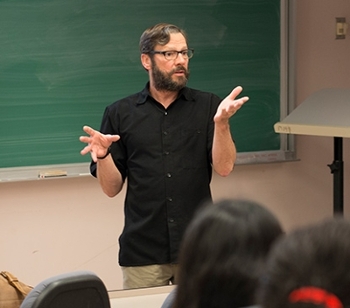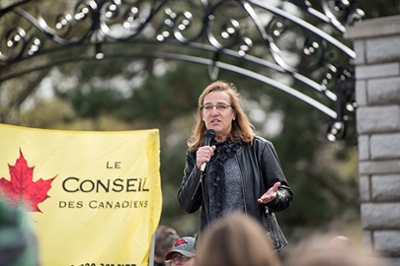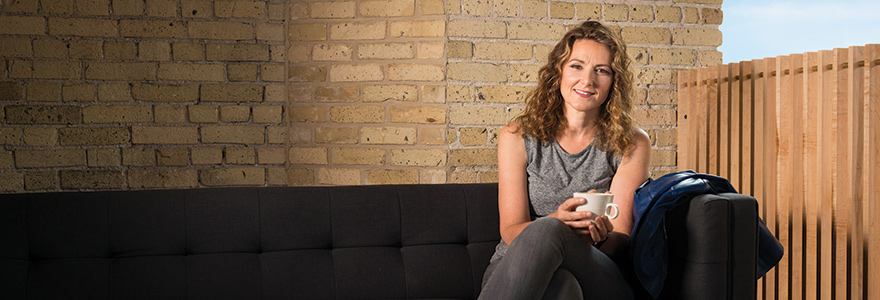Wielding the Lasso of Truth
How scientists and medical professionals are crusading against ‘alternative facts’ and the rise of pseudoscience
By Crystal Mackay, MA’05
Alumna Dr. Jennifer Gunter made international headlines this past year for her pointed and passionate criticism of a celebrity lifestyle and wellness website, calling it out on social media and her blog for promoting the myths that bras cause breast cancer, tomatoes cause obesity and condoms are carcinogenic.
Dr. Gunter, an obstetrician/gynaecologist and pain medicine specialist practising in San Francisco, California, was born in Winnipeg and completed her residency training at Schulich Medicine & Dentistry. That high-profile post is just one example of her mission to be a voice for science and evidence-based medicine online.
When the front-page of a well-known Canadian newspaper prominently featured a controversial article outlining the stories of women who claimed to have experienced catastrophic negative side-effects, including developing autoimmune disorders, as a result of the HPV vaccine, she immediately sat down at her keyboard to write a response.
On her blog, aptly titled ‘wielding the lasso of truth,’ she reflected on her own tragic loss of one of her triplets, and how her husband grappled to understand what she might have done in the week leading up to the loss to cause her to go into premature labour. She likened this experience to that of the women featured in the article.
“This is very important when we understand vaccine fears,” she wrote, “because bad things do happen to people and many, many people get vaccines. So catastrophic things will sometimes happen to people shortly after they get vaccinated and it is the job of science to figure out if this is cause and effect or not.”
The article, she said, missed reporting key scientific studies showing absolutely no difference in the number of women who developed autoimmune disorders after receiving the vaccine, versus the control group.
“After I wrote that blog post, other scientists spoke up; other journalists spoke up. And it solidified for me that if everyone just stays quiet, then nothing happens,” she said.
Her blog post was republished by CANADALAND, a news site whose primary focus is on media and media criticism, and was shared widely on social media. Soon after, a group of scientists also penned a letter to the newspaper denouncing the article, and it was eventually pulled.
Dr. Gunter has been writing her blog and tweeting about pseudoscience for almost a decade – it is all in an effort to quell the tide of pseudoscience and distrust of medical experts that seems to be infiltrating the mainstream.
Earlier this year, the Edelman Trust Barometer (a survey that measures the population’s trust in business, government, non-governmental organizations, and media), showed that Canadians’ trust in institutions was at an all-time low. The survey results indicated that more than half of Canadians don’t listen to people or organizations they disagree with and that they are more than 3.5 times more likely to ignore information that supports a position they don’t believe in.
Edelman called it, “an echo chamber effect which is magnifying the crisis in trust.”
“We are in a time when academics and the press are talking a lot about this idea of the ‘death of expertise,’” said Savita Dhanvantari, MSc’92, PhD, a professor in Medical Biophysics who encourages her colleagues to speak to the public about their work in a way that the average Joe can understand. She tweets about interesting research using the hashtag #coolscience.
“Some of this distrust of experts is our fault. During the past several decades, increasingly the experts started talking amongst themselves and didn’t transmit that to the public. And the public got the idea that these professors and experts did whatever they did and it was irrelevant to their world.
“We are missing the boat if we are not communicating what we are doing, why we are doing it, why it’s so important, and how it directly impacts people’s lives,” Dhanvantari said.
 And the impact on people’s lives can be profound. Mark Speechley, BA’79, MA’82, PhD’87, a professor of Epidemiology and Biostatistics and an educator in the Schulich Interfaculty Program in Public Health, outlines some ways that distrust in science has had a direct impact on human health. Dwindling vaccine-compliance, changing views on fluoride in our water and the rise of poorly evaluated natural health products are some of the most obvious examples.
And the impact on people’s lives can be profound. Mark Speechley, BA’79, MA’82, PhD’87, a professor of Epidemiology and Biostatistics and an educator in the Schulich Interfaculty Program in Public Health, outlines some ways that distrust in science has had a direct impact on human health. Dwindling vaccine-compliance, changing views on fluoride in our water and the rise of poorly evaluated natural health products are some of the most obvious examples.
“We have a hugely successful human invention called ‘science’ that some people reject outright, or believe in only selectively according to their ideologies and self-interests,” said Speechley. “My view is that the validity of scientific findings exists apart from whether we hope they are true or false, or how well we understand science because viruses do not have political views; vaccination prevents diseases in conservatives and liberals equally. And a molecule will treat a disease whether or not a patient agrees with the laws of chemistry or physics. Science makes mistakes, but scientists are trained to identify errors.”
“We have a hugely successful human invention called ‘science’ that some people reject outright, or believe in only selectively according to their ideologies and self-interests.”
—Mark Speechley, BA’79, MA’82, PhD’87
The fact that science makes mistakes, and that part of the scientific method involves testing, retesting and revising theories, might be part of the reason why some people distrust it, but Speechley says it’s also what makes it work. “Every time we have to refine the scientific record, some people think we don’t know what we’re talking about. But science is designed to be self-correcting,” he said.
 As an educator who is instrumental in imparting critical thinking skills to the 60 Master of Public Health graduates each year, Speechley is certain that education will go a long way in restoring trust in evidence-based health care and health policies.
As an educator who is instrumental in imparting critical thinking skills to the 60 Master of Public Health graduates each year, Speechley is certain that education will go a long way in restoring trust in evidence-based health care and health policies.
It’s a concept that Susanne Schmid, PhD, associate professor in Anatomy and Cell Biology, calls ‘scientific literacy.’ She stood shoulder-to-shoulder alongside hundreds of her colleagues at London’s local event as part of the global March for Science this past year, speaking out about the importance of science.
She said if the public better understands how science works – the peer review process and how to discriminate between what is a good study and what isn’t – it will help to solidify what the March was trying fervently to communicate: that science matters.
She points out that the scourge of information online can often be difficult to navigate through, and the rise of ‘alternative facts,’ fake news and bogus scientific journals are only confusing things further.
“That’s why all of these marches for science started to emerge and I think people should be aware that it’s not about scientists; this is about all of us,” she said. “If we don’t base our policies and decisions on science, and base them instead on some made-up alternate facts then we are all in trouble.”
But even with all of these crusaders for science, the issue remains a complex one because of the innate and built-in human interplay between evidence and emotion.
“It seems to boil down to if you read something that aligns with worldview or cultural philosophy you will believe that,” said Dhanvantari. “And no matter how much we as scientists try to refute these arguments and say ‘here are the facts,’ it often backfires.”
“We are in a time when academics and the press are talking a lot about this idea of the ‘death of expertise.’ We are missing the boat if we are not communicating what we are doing, why we are doing it, and why it’s so important, and how it directly impacts people’s lives.” —Savita Dhanvantari, PhD
She says this is actually a documented psychological phenomenon called ‘the backfire effect.’ It is described as the process by which people argue against information that challenges their beliefs in order to bolster their pre-existing views, and by doing so, it leads them to opinions that are more extreme than they otherwise would have had.
Despite that, scientists, doctors and truth-wielders will continue to make their voices heard, with the firm hope and belief that science will prevail.
“One of the solutions to pollution is dilution,” says Dr. Gunter. “Everyone is talking about medicine online, except doctors. That’s why I keep on doing what I’m doing with my blog and social media. The more good information we put out there, the more we can push down the bad information.”









